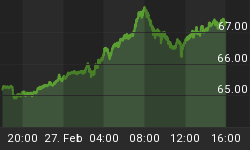There's no question that the time frame of many traders and investors - as well as commercial establishments - has become decidedly short term in nature ever since the end of the secular bull market in 2000. There was good reason for this as the ensuing bear market decline of 2000-2002 resulted in substantial loss of capital for many a long term investor.
The ensuing focus (nay, obsession) with what some have called "short-termism" was completely to be expected in light of the heightened volatility of the years following 2000 as several long- and intermediate financial and economic cycles have criss-crossed at irregular intervals ever since. Translation: the markets (especially for equities) have become the domain of the short term trader as mainly those with a nimble, near term outlook have survived the myriad waves and crosscurrents.
One manifestation of this incessant concern with short term performance is the growth of the hedge fund industry. By seeking to capitalize on near-term stock market trends in both directions, the hedge fund offers a viable alternative (at least in theory) to the potentially destructive strategy of "buy and hold."
Yet despite this obvious skewing of the average investor's stance toward the short term, born of the desire for economic survival, there are heard every now and then the cries of supposedly enlightened persons for a return to a longer term investment focus.
To take one recent example, an editorial written by former U.S. Vice President Al Gore and David Blood of Generation Investment Management appeared in the London Financial Times under the headline, "It is essential that investors look to the long term." Gore and Blood argue that "the investment community must embrace genuine long-term thinking," cautioning that "Short-termism will stifle innovation, damage economies, impair our pension systems and erode our standard of living."
And what do they define as "long term"? According to Gore and Blood, this means an investment horizon of "roughly five years, or through a business cycle." I would propose that if an investor were to blithely follow this recommendation in today's equity market, his experience could be described by the last names of the two editorialists.
Along these lines, I recently received the following query: "...the question: Where to put money long term? Warren Buffet and George Soros are buying foreign currencies. Is this something you would advise? Can you elaborate?"
With the peaking of the 30-year cycle in 1999/2000 and the 20-year cycle in 2004 we are now in an unusual, once-a-century situation of having precious few long-term investment opportunities. For reasons described in the foregoing, long term "buy and hold" opportunities in stocks are precious few in number. Here are some considerations:
* The 6-year cycle peaks this fall. Previous peaks of this important cycle have produced sudden downdrafts in equities prices, including the 1987 crash.
* The 8-year cycle bottoms in later 2006. The last time this cycle came down in 1998 it brought the shortest bear market on record - a 22% decline in a 2-month period - and was accompanied by the LTCM collapse and the Asian currency crisis.
* The 10-year cycle peaks in 2009/2010 and the final "hard down" phase of the 120-year cycle kicks off around this time along with the final descending phase of the K-wave.
With this interaction of cycle peaks and bottoms between now and 2009, why should an investor embrace a nonchalant "long term" investment posture when he might be fortunate (depending on his choice of asset allocation) to break even during this roller coaster ride between 2005-2009?
The mantra of the last half of the Twentieth Century was "bigger is better." I believe the new philosophical underpinning of the next 10 years will be "smaller is better." Or as the authors (Jack Uldrich and Deb Newberry) of a groundbreaking book have put it, "The Next Big Thing is Really Small."
One market sector that could end up leading the anticipated 2007-2009 final leg of the cyclical bull market prior to the 120-year cycle collapse is the Nanotech sector. As Jack Uldrich and Deb Newberry have expertly chronicled in their book, nanotechnology will have an impact of almost every major industry and business sector, including the gold mining sector. Just as the Internets led in the late '90s,the nanotechs could well be the rage after the 8-year cycle bottoms in 2006 (more on this topic in future commentaries).
Samuel J. Kress of SineScope offers some profound insights on the future of the long-term investor. In his Special Edition V research paper under the heading of "Contemporary Investing" he writes, "The traditional mind set of the conventional 'long term fundamental' investor of buy and hold and 100% invested that was effective during the past half century became no longer after the historical change in 2000. The conventional must change from long term fundamental orientation to interim market orientation not only to achieve returns but also to retain them."
"The old generals fight the old wars" as Kress is apt to say in reference to those who refuse to change with the market currents. In the final half of this decade, the best returns are likely to come from investors who are flexible enough to capture the short-to-intermediate-term moves without succumbing to the temptation of "long-termism" or "buying and forgetting."















